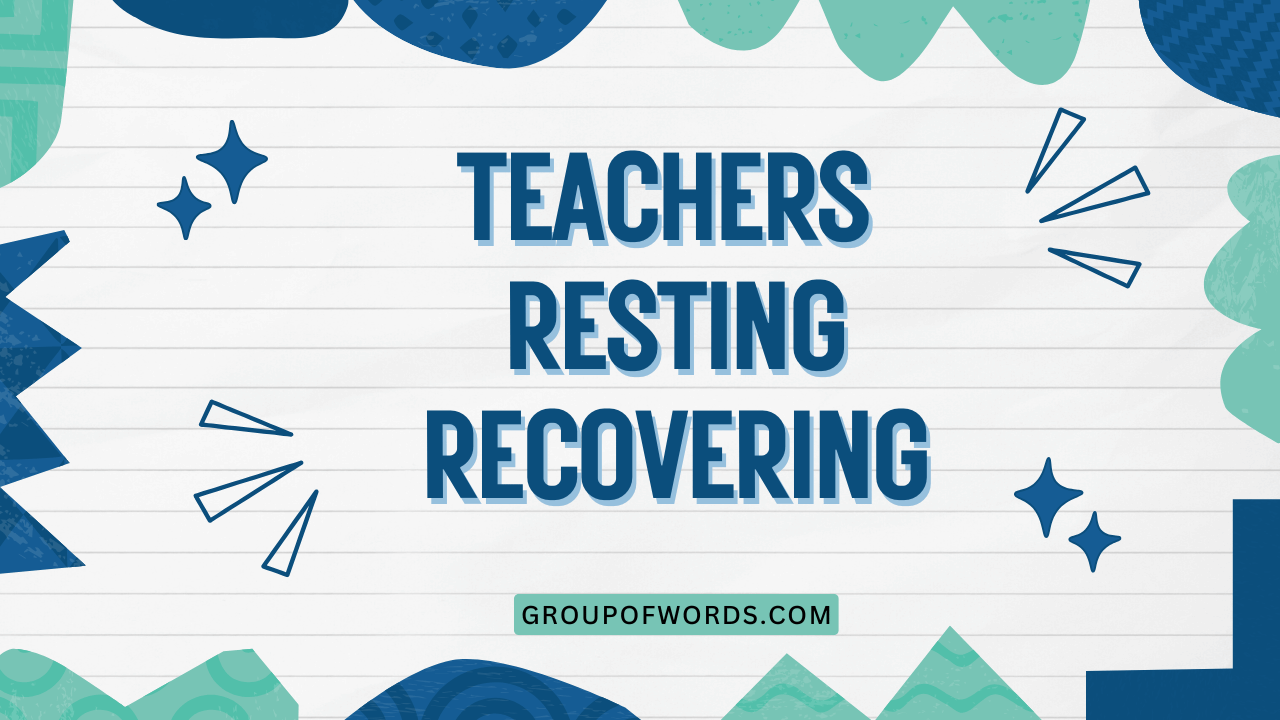Teachers: Rest, Recover, and the Grammar of Wellbeing
Understanding how to correctly use verbs and nouns related to rest and recovery is crucial, especially when discussing the wellbeing of professionals like teachers. This article delves into the grammar surrounding “teachers resting,” “teachers recovering,” and related phrases, exploring their proper usage, structural nuances, and common pitfalls.
Mastering these concepts will enable you to communicate more effectively and accurately about teacher wellness. This guide is perfect for English language learners, educators, and anyone interested in refining their grammar skills while addressing an important societal topic.
This article is structured to provide a comprehensive understanding of the grammar involved, offering numerous examples, practical exercises, and insightful tips to help you confidently use these phrases in your writing and speech. By the end of this guide, you will have a solid grasp of the grammatical rules and conventions that govern the use of “teachers resting” and “teachers recovering,” empowering you to express yourself with clarity and precision.
Table of Contents
- Introduction
- Definition: Teachers, Rest, and Recovery
- Structural Breakdown
- Types and Categories
- Examples
- Usage Rules
- Common Mistakes
- Practice Exercises
- Advanced Topics
- FAQ
- Conclusion
Definition: Teachers, Rest, and Recovery
The phrases “teachers resting” and “teachers recovering” describe specific states of being. “Teachers” refers to individuals who impart knowledge and skills to students.
“Resting” implies a state of inactivity or relaxation, often to regain energy. “Recovering” suggests a process of returning to a normal state of health or strength after illness, injury, or exertion.
Grammatically, “resting” and “recovering” can function as verbs (in participle form) or nouns (as gerunds), depending on the sentence structure.
Understanding the nuances of these terms is essential for accurately conveying the intended meaning. For example, “teachers resting” might refer to teachers taking a break during the school day, while “teachers recovering” could describe teachers taking time off work due to illness or burnout.
The context in which these phrases are used significantly impacts their interpretation.
Structural Breakdown
The grammatical structure of sentences involving “teachers resting” and “teachers recovering” can vary. Here’s a breakdown of the key elements:
- Subject: “Teachers” typically acts as the subject of the sentence.
- Verb: “Resting” or “recovering” can function as a verb, often in the present participle form (e.g., “are resting,” “were recovering”). Alternatively, they can function as gerunds.
- Auxiliary Verbs: Auxiliary verbs like “is,” “are,” “was,” “were,” “have been,” and “had been” are often used to form different tenses and aspects.
- Modifiers: Adjectives and adverbs can be used to provide additional information about the teachers or their state of rest or recovery.
For example, in the sentence “The teachers are resting in the lounge,” “teachers” is the subject, “are resting” is the verb phrase (present continuous tense), and “in the lounge” is a prepositional phrase modifying the verb. Understanding these structural components is crucial for constructing grammatically correct and meaningful sentences.
Types and Categories
Present Participle: ‘Resting’ and ‘Recovering’ as Verbs
When “resting” and “recovering” are used as present participles, they function as verbs indicating an ongoing action. They are often used with auxiliary verbs to form continuous tenses (e.g., present continuous, past continuous, present perfect continuous).
This usage emphasizes the duration or process of resting or recovering.
Example: “The teachers are resting after a long day of teaching.” Here, “are resting” is the present continuous tense of the verb “to rest,” indicating that the teachers are currently in the process of resting.
Gerund: ‘Resting’ and ‘Recovering’ as Nouns
When “resting” and “recovering” are used as gerunds, they function as nouns. They can act as the subject of a sentence, the object of a verb, or the object of a preposition.
This usage emphasizes the activity of resting or recovering itself.
Example: “Resting is essential for teachers’ wellbeing.” Here, “resting” is the subject of the sentence and functions as a noun. It refers to the act of resting rather than an ongoing action.
Noun Modifiers: ‘Resting Teachers’ and ‘Recovering Teachers’
“Resting” and “recovering” can also function as noun modifiers (participle adjectives), describing the state of the teachers. In this case, they directly precede the noun “teachers” and provide additional information about them.
This usage emphasizes the characteristic or condition of the teachers.
Example: “Resting teachers need a quiet space to recharge.” Here, “resting” modifies “teachers,” indicating that the teachers are currently in a state of rest.
Examples
Present Participle Examples
The following table provides a range of examples using “resting” and “recovering” as present participles in various tenses. These examples illustrate how these verbs can be used to describe ongoing actions in different time frames.
| Sentence | Tense | Explanation |
|---|---|---|
| The teachers are resting now. | Present Continuous | Describes an action happening at the present moment. |
| The teachers were resting when the principal arrived. | Past Continuous | Describes an action that was in progress at a specific time in the past. |
| The teachers will be resting after the conference. | Future Continuous | Describes an action that will be in progress at a specific time in the future. |
| The teachers have been resting all afternoon. | Present Perfect Continuous | Describes an action that started in the past and is still continuing. |
| The teachers had been resting before the students arrived. | Past Perfect Continuous | Describes an action that was in progress before another action in the past. |
| The teachers are recovering from the flu. | Present Continuous | Describes an ongoing process of regaining health. |
| The teachers were recovering from the stress of exams. | Past Continuous | Describes a past process of regaining health after a stressful period. |
| The teachers will be recovering during the summer break. | Future Continuous | Describes a future process of regaining health. |
| The teachers have been recovering slowly but surely. | Present Perfect Continuous | Describes a process that started in the past and continues to the present. |
| The teachers had been recovering for a week before returning to work. | Past Perfect Continuous | Describes a process that occurred before another past event. |
| Some teachers are actively resting during their lunch break. | Present Continuous | Emphasizes the active choice to rest. |
| The exhausted teachers were barely resting, constantly interrupted by emails. | Past Continuous | Highlights the difficulty in resting due to interruptions. |
| The teachers will be properly resting once the school year ends. | Future Continuous | Specifies when the resting period will occur. |
| The teachers have been gradually recovering their energy levels. | Present Perfect Continuous | Focuses on the gradual improvement in energy. |
| The teachers had been diligently recovering before they resumed teaching duties. | Past Perfect Continuous | Shows prior recovery efforts before returning to work. |
| The teachers are now recovering from a demanding project. | Present Continuous | Indicates current recovery after a strenuous task. |
| The teachers were slowly recovering after the challenging school trip. | Past Continuous | Describes a slow recovery following a difficult event. |
| The teachers will be fully recovering their strength by next month. | Future Continuous | Projects a future complete recovery. |
| The teachers have been continuously recovering throughout the vacation. | Present Perfect Continuous | Highlights the consistent recovery process. |
| The teachers had been steadily recovering before the new term started. | Past Perfect Continuous | Specifies recovery before a new period. |
| The teachers are resting comfortably in the break room. | Present Continuous | Describes the current state of rest. |
| The teachers were recovering slowly from their illnesses. | Past Continuous | Describes the past state of recovery. |
| The teachers will be resting peacefully during their vacation. | Future Continuous | Describes the future state of rest. |
| The teachers have been recovering steadily from the stress. | Present Perfect Continuous | Describes the continuous recovery from stress. |
| The teachers had been resting quietly before the meeting started. | Past Perfect Continuous | Describes the state of rest before a past event. |
Gerund Examples
The following table illustrates the use of “resting” and “recovering” as gerunds functioning as nouns in various sentence structures. These examples demonstrate how these words can act as subjects, objects, or complements within a sentence.
| Sentence | Function | Explanation |
|---|---|---|
| Resting is crucial for teachers’ mental health. | Subject | “Resting” acts as the subject of the sentence. |
| The school supports teachers by providing time for recovering. | Object of Preposition | “Recovering” is the object of the preposition “for.” |
| Teachers find that resting helps them to be more effective. | Subject | “Resting” acts as the subject of the clause. |
| The goal is recovering from burnout. | Subject Complement | “Recovering” completes the meaning of the subject “The goal.” |
| Ignoring resting can lead to exhaustion. | Subject | “Resting” acts as the subject. |
| Recovering after a long day is essential for teachers. | Subject | “Recovering” acts as the subject of the sentence. |
| The school prioritizes resting for its teachers. | Object of Preposition | “Resting” is the object of the preposition “for.” |
| Teachers acknowledge that recovering is necessary to avoid burnout. | Subject | “Recovering” acts as the subject of the clause. |
| Their main focus is resting adequately. | Subject Complement | “Resting” completes the meaning of the subject “Their main focus.” |
| Delaying recovering can have negative consequences. | Subject | “Recovering” acts as the subject. |
| Promoting resting is a key strategy for teacher retention. | Subject | “Resting” is the subject of the sentence. |
| The school actively encourages recovering through wellness programs. | Object of Preposition | “Recovering” is the object of the preposition “through.” |
| Many teachers believe that resting improves their teaching performance. | Subject | “Resting” acts as the subject of the clause. |
| The most important thing is resting fully during the break. | Subject Complement | “Resting” completes the meaning of the subject “The most important thing.” |
| Postponing recovering can lead to chronic stress. | Subject | “Recovering” acts as the subject. |
| Prioritizing resting benefits both teachers and students. | Subject | “Resting” acts as the subject. |
| The administration supports recovering through flexible schedules. | Object of Preposition | “Recovering” is the object of the preposition “through.” |
| Teachers understand that resting enhances their overall wellbeing. | Subject | “Resting” acts as the subject of the clause. |
| One solution is recovering effectively after stressful events. | Subject Complement | “Recovering” completes the meaning of the subject “One solution.” |
| Neglecting recovering can result in decreased productivity. | Subject | “Recovering” acts as the subject. |
| Facilitating resting is essential for teacher satisfaction. | Subject | “Resting” acts as the subject of the sentence. |
| The district promotes recovering by offering mental health resources. | Object of Preposition | “Recovering” is the object of the preposition “by.” |
| Teachers know that resting helps them to avoid burnout. | Subject | “Resting” acts as the subject of the clause. |
| A key element of self-care is resting regularly. | Subject Complement | “Resting” completes the meaning of the subject “A key element of self-care.” |
| Ignoring recovering can lead to long-term health issues. | Subject | “Recovering” acts as the subject. |
Noun Modifier Examples
The following table provides examples of “resting” and “recovering” used as noun modifiers, describing the state or condition of the teachers. These examples illustrate how these words can be used to provide additional information about the teachers.
| Sentence | Explanation |
|---|---|
| Resting teachers need a quiet space to recharge. | “Resting” modifies “teachers,” indicating teachers who are currently resting. |
| Recovering teachers require understanding and support. | “Recovering” modifies “teachers,” indicating teachers who are in the process of recovering. |
| The resting teachers were grateful for the break. | “Resting” modifies “teachers,” describing teachers who are taking a break. |
| Recovering teachers often benefit from reduced workloads. | “Recovering” modifies “teachers,” describing teachers who are recovering from something. |
| Resting teachers should avoid stressful activities. | “Resting” modifies “teachers,” advising teachers who are resting. |
| Resting teachers are often more productive after a break. | “Resting” modifies “teachers,” indicating teachers who have rested. |
| Recovering teachers need time to heal and rejuvenate. | “Recovering” modifies “teachers,” describing teachers in a recovery phase. |
| The resting teachers appreciated the comfortable chairs. | “Resting” modifies “teachers,” describing teachers who are resting. |
| Recovering teachers may require additional medical care. | “Recovering” modifies “teachers,” referring to teachers in need of recovery. |
| Resting teachers can return to work feeling refreshed. | “Resting” modifies “teachers,” describing teachers after a period of rest. |
| Resting teachers often experience improved mental clarity. | “Resting” modifies “teachers,” indicating teachers who are currently resting. |
| Recovering teachers benefit from a supportive work environment. | “Recovering” modifies “teachers,” indicating teachers who are in the process of recovering. |
| The resting teachers enjoyed the peaceful atmosphere. | “Resting” modifies “teachers,” describing teachers who are taking a break. |
| Recovering teachers need empathy and patience from colleagues. | “Recovering” modifies “teachers,” describing teachers who are recovering from something. |
| Resting teachers should prioritize self-care activities. | “Resting” modifies “teachers,” advising teachers who are resting. |
| Resting teachers typically return with renewed enthusiasm. | “Resting” modifies “teachers,” indicating teachers who have rested. |
| Recovering teachers require a gradual return to their duties. | “Recovering” modifies “teachers,” describing teachers in a recovery phase. |
| The resting teachers appreciated the thoughtful gesture. | “Resting” modifies “teachers,” describing teachers who are resting. |
| Recovering teachers may need adjustments to their teaching schedule. | “Recovering” modifies “teachers,” referring to teachers in need of recovery. |
| Resting teachers often report feeling less stressed. | “Resting” modifies “teachers,” indicating teachers who are currently resting. |
| Recovering teachers can contribute valuable insights from their experiences. | “Recovering” modifies “teachers,” indicating teachers who are in the process of recovering. |
| The resting teachers found the quiet room to be very helpful. | “Resting” modifies “teachers,” describing teachers who are taking a break. |
| Recovering teachers often participate in wellness workshops. | “Recovering” modifies “teachers,” describing teachers who are recovering from something. |
| Resting teachers should focus on relaxation techniques. | “Resting” modifies “teachers,” advising teachers who are resting. |
| Resting teachers usually come back with fresh perspectives. | “Resting” modifies “teachers,” indicating teachers who have rested. |
| Recovering teachers often require a supportive community. | “Recovering” modifies “teachers,” describing teachers in a recovery phase. |
| The resting teachers expressed their gratitude to the administration. | “Resting” modifies “teachers,” describing teachers who are resting. |
| Recovering teachers might benefit from peer support groups. | “Recovering” modifies “teachers,” referring to teachers in need of recovery. |
Usage Rules
Subject-Verb Agreement
Ensure that the verb agrees with the subject in number. Since “teachers” is plural, use plural verb forms.
For example:
- Correct: The teachers are resting.
- Incorrect: The teachers is resting.
When “resting” or “recovering” is used as a gerund and acts as the subject, it is treated as singular. For example:
- Correct: Resting is important.
- Incorrect: Resting are important.
It’s crucial to maintain consistency between the subject and the verb form to ensure grammatical accuracy in your sentences. In the case of “teachers,” which is a plural noun, the verb must also be in its plural form.
When “resting” or “recovering” is used as a gerund functioning as the subject of the sentence, it is considered a singular entity, and thus requires a singular verb form. Failure to adhere to this rule will result in grammatical errors and potential misinterpretations of the intended meaning.
Tense Consistency
Maintain consistent verb tenses within a sentence or paragraph. If you start in the past tense, continue in the past tense unless there’s a valid reason to switch.
For example:
- Correct: The teachers were resting, and they felt refreshed.
- Incorrect: The teachers were resting, and they feel refreshed.
Tense consistency is vital for creating coherent and logical narratives. Abrupt shifts in tense can confuse the reader and disrupt the flow of the text.
Ensure that the verbs in your sentences align temporally, reflecting the sequence of events or the duration of actions as intended. Exceptions to this rule exist when expressing general truths or timeless facts, which are typically conveyed in the present tense.
However, within a specific context or narrative, maintaining a consistent tense is crucial for clarity and cohesion.
Article Usage
Use articles (“a,” “an,” “the”) correctly. “The” is used to refer to specific teachers, while “a” or “an” would be used in a more general sense (though less common with “teachers” in this context).
For example:
- Correct: The teachers are resting in the staff room. (Specific teachers)
- Less Common: Teachers need resting periods. (General statement)
The correct use of articles is essential for conveying the intended specificity or generality of the noun. “The” denotes a particular instance or group, implying that the reader or listener is aware of the specific entity being referred to.
Conversely, “a” and “an” introduce a non-specific or indefinite instance of the noun. In the context of “teachers resting,” using “the” implies that you are referring to a particular group of teachers known to both the speaker and the audience.
The absence of an article suggests a more general or abstract concept, although this usage is less common and may require careful consideration to ensure clarity and naturalness.
Common Mistakes
Here are some common mistakes to avoid:
| Incorrect | Correct | Explanation |
|---|---|---|
| The teacher are resting. | The teachers are resting. | Subject-verb agreement error. “Teachers” is plural, so the verb should be “are.” |
| Resting are important. | Resting is important. | Gerund as subject takes a singular verb. |
| Teachers was recovering. | Teachers were recovering. | Plural subject requires plural verb. |
| The teachers is rest. | The teachers are resting. | Incorrect verb form. |
| Teacher resting. | The teachers are resting. | Missing auxiliary verb and article. |
| Teachers recovering after the long day, they feel better. | Teachers recovering after the long day feel better. | Sentence fragment corrected. |
Avoiding these common mistakes can significantly improve the clarity and accuracy of your writing. Always double-check for subject-verb agreement, proper tense usage, and correct article usage.
By being mindful of these potential pitfalls, you can ensure that your sentences are grammatically sound and effectively convey your intended message.
Practice Exercises
Exercise 1: Identifying Correct Usage
Choose the correct sentence from each pair.
| Question | Option A | Option B | Answer |
|---|---|---|---|
| 1. Which sentence is correct? | The teachers is resting. | The teachers are resting. | B |
| 2. Which sentence is correct? | Resting are important for teachers. | Resting is important for teachers. | B |
| 3. Which sentence is correct? | Recovering teachers need support. | Recovering teachers needs support. | A |
| 4. Which sentence is correct? | Teachers was recovering after the exams. | Teachers were recovering after the exams. | B |
| 5. Which sentence is correct? | The teachers is rest. | The teachers are resting. | B |
| 6. Which sentence is correct? | Teachers resting. | The teachers are resting. | B |
| 7. Which sentence is correct? | Resting regularly helping teachers. | Resting regularly helps teachers. | B |
| 8. Which sentence is correct? | The teachers has been recovering. | The teachers have been recovering. | B |
| 9. Which sentence is correct? | Recovering is take time. | Recovering takes time. | B |
| 10. Which sentence is correct? | The teacher are recovering. | The teachers are recovering. | B |
Exercise 2: Sentence Completion
Complete the following sentences with the correct form of “rest” or “recover.”
| Question | Answer |
|---|---|
| 1. The teachers ______ after a long day of teaching. (are) | are resting |
| 2. ______ is essential for avoiding burnout. (Rest) | Resting |
| 3. The ______ teachers appreciated the quiet room. (Recover) | Recovering |
| 4. They ______ from their illnesses slowly. (were) | were recovering |
| 5. ______ helps teachers to be more effective. (Rest) | Resting |
| 6. The teachers ______ during the summer break. (will) | will be resting |
| 7. ______ allows teachers to rejuvenate. (Recover) | Recovering |
| 8. The teachers ______ steadily before returning to work. (had) | had been recovering |
| 9. The goal is ______ from the stress of teaching. (Recover) | recovering |
| 10. The teachers ______ their energy levels. (have) | have been recovering |
Exercise 3: Error Correction
Identify and correct the errors in the following sentences.
| Question | Corrected Sentence |
|---|---|
| 1. The teacher are resting in the staff room. | The teachers are resting in the staff room. |
| 2. Resting are important for their health. | Resting is important for their health. |
| 3. Recovering teacher need support. | Recovering teachers need support. |
| 4. The teachers was recover. | The teachers were recovering. |
| 5. Teachers resting after school. | The teachers are resting after school. |
| 6. A teacher are recovering. | The teachers are recovering. |
| 7. Recovering is take time. | Recovering takes time. |
| 8. Teachers has been resting. | Teachers have been resting. |
| 9. The teachers is recovering well. | The teachers are recovering well. |
| 10. Resting can helps teachers. | Resting can help teachers. |
Advanced Topics
Complex Sentences
Using complex sentences can add depth and nuance to your writing. For example:
“Because teachers are resting after a long day, they are better prepared to teach effectively the next day.”
This sentence uses a subordinate clause (“Because teachers are resting after a long day”) to explain the reason for the main clause (“they are better prepared to teach effectively the next day”).
Complex sentences allow you to express intricate relationships between ideas, providing context and elaboration. By incorporating subordinate clauses, you can create a more sophisticated and informative narrative.
These clauses can introduce reasons, conditions, or timeframes, enhancing the overall clarity and depth of your writing. Mastering the art of constructing complex sentences is a valuable skill for advanced English learners seeking to articulate complex concepts with precision.
Idiomatic Expressions
While not directly related to “teachers resting” or “teachers recovering,” understanding idioms related to rest and recovery can be helpful. For example:
- “Recharge your batteries” (to rest and regain energy)
- “Take a load off” (to relax)
Idiomatic expressions add color and vibrancy to the English language. While they may not always be directly applicable to the specific phrases “teachers resting” or “teachers recovering,” understanding idioms related to rest, relaxation, and recovery can enrich your vocabulary and enhance your ability to communicate effectively.
These expressions often convey nuanced meanings or cultural connotations that are not immediately apparent from their literal interpretations. Incorporating idioms appropriately can make your writing more engaging and relatable, demonstrating a deeper understanding of the English language and its cultural nuances.
FAQ
- Is it correct to say “teacher resting” without an article?
While grammatically possible in some contexts (e.g., as a heading), it’s generally better to use “the teachers resting” or “teachers resting” for clarity. Omitting the article can sound unnatural in most sentences.
- What is the difference between “teachers are resting” and “teachers rest”?
“Teachers are resting” (present continuous) describes an action happening now. “Teachers rest” (simple present) describes a habitual action or general truth.
- Can “resting” be used as an adjective?
Yes, as in “resting teachers,” where it describes the state of the teachers.
- Is “teachers recovering” always about physical health?
No, it can also refer to recovering from stress, burnout, or emotional exhaustion.
- How can I use “resting” and “recovering” in formal writing?
Ensure proper subject-verb agreement, tense consistency, and avoid colloquialisms. Use complex sentences to express nuanced ideas.
- What are some synonyms for “resting” in this context?
Relaxing, taking a break, unwinding, recuperating.
- What are some synonyms for “recovering” in this context?
Recuperating, healing, regaining strength, bouncing back.
- How do I emphasize the importance of teachers resting in a sentence?
You can use adverbs like “critically,” “vitally,” or “absolutely,” as in “Resting is absolutely vital for teachers’ wellbeing.”
Conclusion
Understanding the grammar surrounding “teachers resting” and “teachers recovering” is crucial for communicating effectively about teacher wellbeing. This article has covered the definition, structural breakdown, types, usage rules, common mistakes, and advanced topics related to these phrases.
By mastering these concepts, you can express yourself with clarity and precision.
Remember to pay attention to subject-verb agreement, tense consistency, and article usage. Practice the exercises provided to reinforce your understanding.
By continuously refining your grammar skills, you can communicate more effectively and advocate
for the importance of teacher wellbeing.






